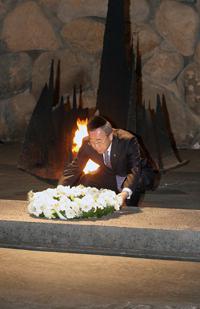
UN Secretary General Ban Ki-moon lays a wreath in memory of the six million Jews killed in the Holocaust at the Hall of Remembrance at Yad Vashem. (photo: Isaac Harari/Yad Vashem)
UN Secretary General Ban Ki-moon (left) and Avner Shalev, Chairman of Yad Vashem, visit the Museum of Holocaust Art at Yad Vashem. (photo: Isaac Harari/Yad Vashem)
26 March 2007
The Secretary General of the United Nations, Ban Ki-moon, visited Yad Vashem today accompanied by Yad Vashem Chairman Avner Shalev, and Chairman of the Yad Vashem Council Joseph (Tommy) Lapid. The Secretary General visited the Holocaust Art Museum, and the Learning Center: Reflections After the Holocaust, and held a memorial ceremony in the Hall of Remembrance. The Secretary General then visited the Children's Memorial, after which he signed the guest book and offered remarks.
The Secretary General said that Yad Vashem is a place where all men and women, diplomats and others, should pay respects, remembering the millions of Jews who were murdered in the Holocaust. "I am appalled by the organized murder of the Holocaust," and wonder how a human being can organize such a thing, Ban Ki-Moon said. He recalled the Righteous Among the Nations, the "heroes" who risked their lives to save Jews during the Holocaust. The international community must never foget what took place, "It is unacceptable do deny historical facts," Ban Ki-Moon stressed, and the international community must work together to prevent genocides, he said.
"I sign this book in memory of the millions of Jews and others who were murdered in the Holocaust, and with determination to do my utmost in the struggle against anti-Semitism, hatred and intolerance around the world. Ki-Moon Ban, Secretary General, United Nations", he wrote.
Avner Shalev, Chairman of Yad Vashem, thanked the Secretary General for coming, and stressed his appreciation to the Secretary General on the UN General Assembly’s resolution earlier this year condemning Holocaust denial. Shalev noted the cooperation between Yad Vashem's International School for Holocaust Studies and the UN's Department of Public Information (DPI), for example, the "electronic notes for speakers" recently uploaded to both websites, and the upcoming seminar for UN personnel at Yad Vashem.
Urging action on Darfur, Shalev said, "It is important that steps be taken to do what we can to stop the murder there. Just recently I was personally moved to host some refugees from Darfur, here at Yad Vashem." Shalev also raised the issue of Iranian Holocaust denial.
Joseph (Tommy) Lapid, Chairman of the Yad Vashem Council, said that Yad Vashem is not just about the past, but also about the present and future. On Darfur, Lapid said, "Yad Vashem cannot keep silent, and I am sure the UN won't either." Addressing the future, Lapid warned, "The leader of Iran is threatening another Holocaust. I am sure you will do your best to do what you can on this issue."
Ban Ki-moon visited the Holocaust History Museum when he was Minister of Foreign Affairs and Trade of the Republic of Korea.






